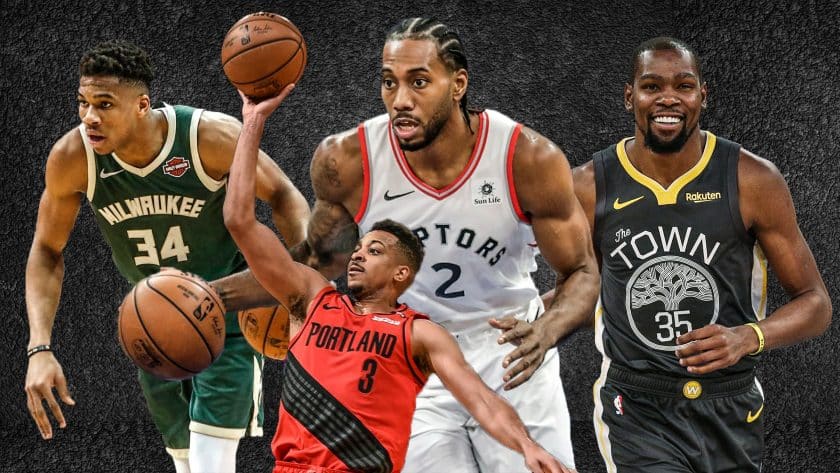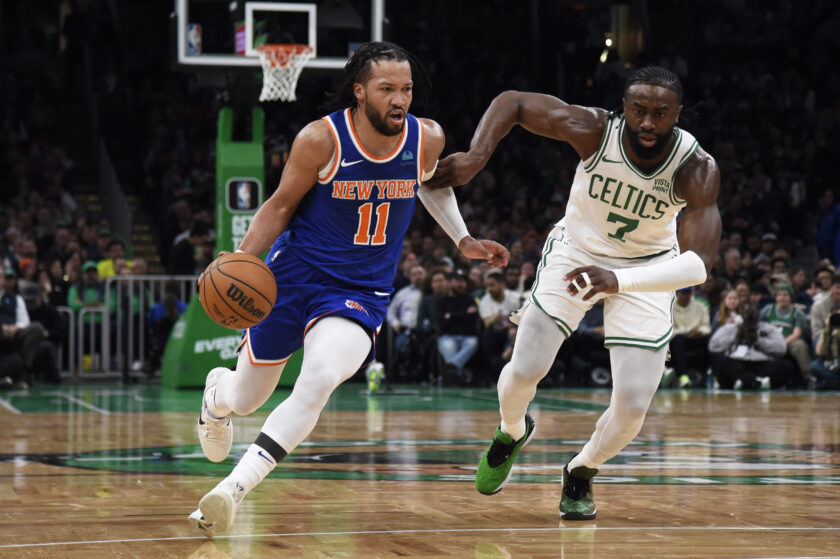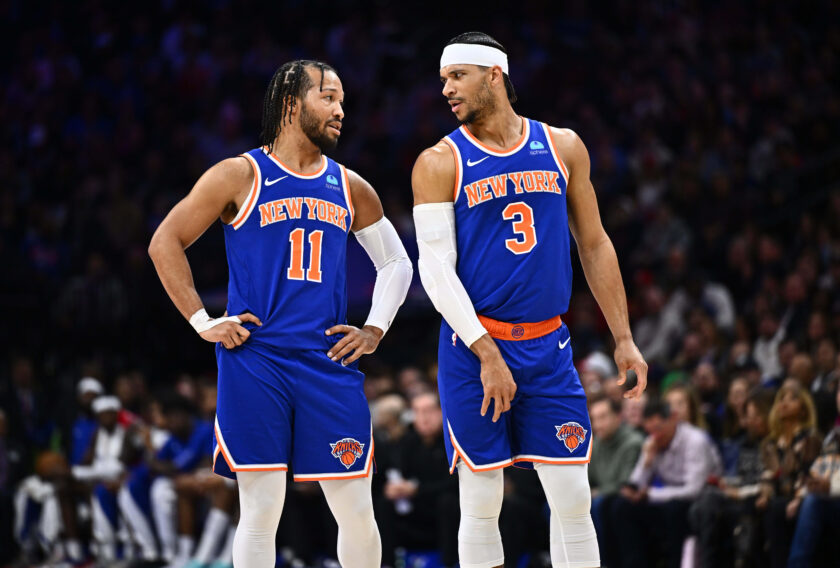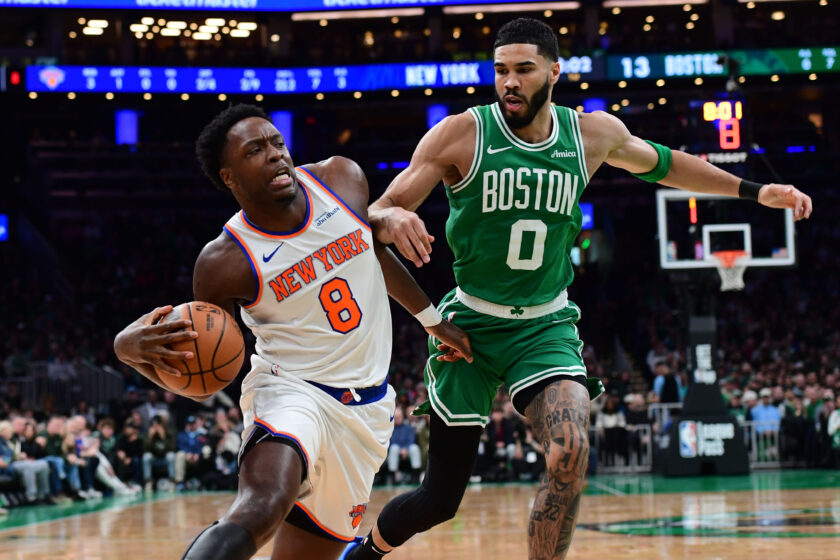One lesson each remaining playoff team has taught the New York Knicks

The four remaining playoff teams in the NBA have taught the New York Knicks one specific lesson along the way.
The New York Knicks are in desperate need of guidance. The team hasn’t made the playoffs since 2013, the current players are young and unproven, and the front office execs are entering the offseason with A lot of money, which likely means A lot of mistakes.
So it’s safe to say that the league’s contenders may have a lesson or two to teach not only the Knicks youngins, but the front office executives as well. And what better way to start than with a team that knows failure all too well.
Portland Trail Blazers
Lesson: Persistence
Up until this season, it had been a tough go for the Trail Blazers. The backcourt core of Damian Lillard and CJ McCollum had proven they could combine for 45-plus per night and boost Portland to a coveted Western Conference Playoff spot. But beyond that, when teams got a chance to actually gameplan for them, the formula for halting the duo had seemed fairly simple.
You put tremendous pressure on Lillard, trap him on pick and rolls, and deny McCollum the ball as much as possible. Basically, let Al-Farouq Aminu and Mo Harkless take as many uncontested jumpers as they wanted. From 2016 (when CJ McCollum had his breakout season) to 2018, the strategy had seen Portland lose three of their four playoff series. The most embarrassing of these losses coming in 2018, when the 3rd seeded Blazers squad was swept by a sixth-seeded Pelicans team.
The offseason that followed was a depressing one for Portland. The team was in the bottom five of the league in terms of payroll, meaning that any major signings were out of the picture; and there were daily rumors that the front office was looking to split up CJ and Lillard. But rather than give in and submit themselves to the pain that is tanking by trading CJ McCollum (yes, it would’ve been CJ), they ran it back with the same core and a few low salary signings.
Now, Portland has found themselves in the Western Conference Finals, already defeating the Thunder (led by former MVP Russell Westbrook) and the Nuggets, who entered the playoffs as the number two seed in the west. Obviously, this run should be largely credited to CJ and Dame. But without Seth Curry, Enes Kanter and Rodney Hood (all of which they signed or traded for this past year), this postseason stint would have already ended. All three have provided some sort of offensive relief. Whether it is creating their own shot (Rodney), moving without the ball and coming off screens (Seth), or crashing the offensive boards (Enes), These throwaway parts from other franchises have been instrumental for the Blazers.
So, the lesson is essentially not to panic. If the Knicks do use their two max slots and things don’t go absolutely perfect the first season, it’s more than likely that New York fans and media will immediately resort to trading a major piece. But it does not have to be that complicated. A few minor signings and allowing the young guys another summer to develop could be all that is needed to kickstart the team. So please fellow Knickerbocker fans, if the team disappoints next season, just try to remember that there are still plenty of guys on the squad under 25 with a lot of potential.
Golden State Warriors
Lesson: Build a superteam that’s capable of playing the entire 82-game regular season out of shape, essentially acknowledging that it doesn’t matter, still finish as the number one seed and then flip the switch for the final 20 games and win their third straight championship with ease.
How hard can it be?
Toronto Raptors
Lesson: Take Chances
I know that I just said the Knicks shouldn’t make any big trades if next season doesn’t go well, but this is completely different. Because the Knicks can’t wait till next year to trade for Anthony Davis. The Pelicans are dealing him this summer one way or another. And if the Knicks have the opportunity, they can’t pass up on a generational player. Just look at the Raptors. They had a very solid team. DeMar DeRozan, Kyle Lowry, Serge Ibaka and a very deep bench (on paper) seemed like a championship caliber squad. But year after year they failed to perform when it mattered most.
So what did they do? They fired the coach of the year and traded their franchise player for a Kawhi Leonard/Danny Green one-year rental. Now, Toronto is in the Eastern Conference Finals and just four wins from their first ever NBA Finals appearance.
[sc name=”Knicks Center” ]However, there is a reason the Knicks trading from Anthony Davis is infinitely scarier than the Raptors trading for Kawhi. The Raptors already knew their current roster makeup wasn’t going to work. Lowry and DeRozan had both reached their peaks and proven they couldn’t lead a team over the hump. With the Knicks, they would be trading a plethora of young guys that could all turn out to be great players. Kevin Knox, RJ Barrett (most likely), DSJ, Mitchell Robinson and Allonzo Trier all have all-star potential and all would likely be dealt in a trade for Davis. But, that’s something the Knicks would have to live with.
Because it seems like the front office wants to compete for a championship quickly, and if that’s the case, you have to fully commit and not half go for it by signing some big names but then just surrounding them with young guys with no playoff experience. It’s either go for the championship and die trying or play for the future and develop young talent.
Milwaukee Bucks
Lesson: Free Agency isn’t do or die
The last time people walked away from the offseason thinking, “Wow, the Bucks did really well in free agency” was when they won the Greg Monroe sweepstakes of 2015. Rather than go for the big fishes in free agency, Milwaukee has focused their energy on signing role players while also building through trades and the draft. Let’s just take a quick look at how they’ve acquired their most notable players:
- Giannis Antetokoumpo: 15th overall pick, 2013 draft
- Khris Middleton: Bucks traded Brandon Jennings to the Pistons in exchange for Brandon Knight, Viacheslav Kravtsov, and Khris Middleton.
- Eric Bledsoe: Buks traded Greg Monroe, a protected first round pick, and a protected second-round pick to the Suns in exchange for Eric Bledsoe.
- Brook Lopez: Signed to a 1-year/$3 million deal in free agency.
- Malcolm Brogdon: 36th pick, 2016 draft
- Nikola Mirotic: Bucks traded Stanley Johnson, Jason Smith, and four second-round picks to the Pelicans in exchange for Nikola Mirotic.
With the exception of Nikola Mirotic and Brook Lopez, the Bucks have built the core of their team through development. And that’s always an option for the Knicks. Realistically, New York just needs two of their five or six young guys to develop into all-star/superstar level players.
I know it sounds tough because it likely means that they’d be bad for another few years; but if they can get two of their guys to truly develop and maybe one other becomes a really good role player, then free agents would really want to come to New York. Again, I’m not saying this is what they should do, but it’s a good backup plan if they strike out in free agency.
[sc name=”Knicks Link Next” link=”https://elitesportsny.com/2019/05/16/new-york-knicks-offseason-an-open-letter-to-gm-scott-perry/” text=”An Open Letter To Scott Perry” ]




